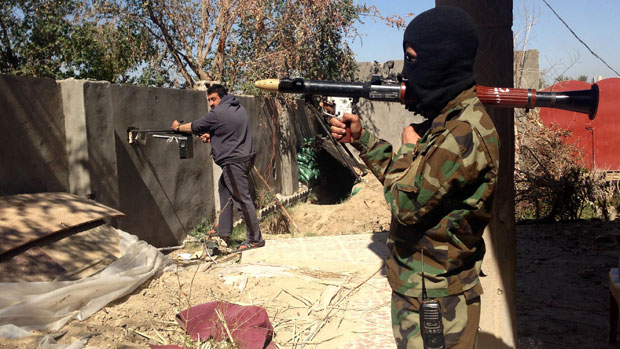Islamic State seizes Ramadi in 'crushing setback' for opposition
Militants use armoured bulldozers and multiple suicide bombers to force Iraqi forces out of city

A free daily email with the biggest news stories of the day – and the best features from TheWeek.com
You are now subscribed
Your newsletter sign-up was successful
Islamic State has seized control of Ramadi, a major Iraqi city, in a "crushing setback" to the countries trying to stem the extremist group's expansion in the region.
The capture of the city, the capital of Iraq's largest province Al Anbar, was described by the Wall Street Journal as Islamic State's "biggest military victory this year".
According to Iraqi officials, government security forces and tribal fighters retreated after militants burst into the city in armoured bulldozers and detonated a series of suicide bomb explosions.
The Week
Escape your echo chamber. Get the facts behind the news, plus analysis from multiple perspectives.

Sign up for The Week's Free Newsletters
From our morning news briefing to a weekly Good News Newsletter, get the best of The Week delivered directly to your inbox.
From our morning news briefing to a weekly Good News Newsletter, get the best of The Week delivered directly to your inbox.
Local officials estimated that more than 500 people had died in the last two days of fighting, including civilians and police who had run out of ammunition. A further 8,000 people were said to have been displaced over the same period.
Retired Lt Col Anthony Shaffer, a senior fellow at the London Centre for Policy Research, said the US-trained Iraqi military units were "basically laying down their guns and running".
However, Muhannad Haimour, the Anbar governor's spokesman, pointed out that it was "very difficult to stop a bulldozer that's been armoured, driven by a suicide bomber, with tons of explosives". He told CNN that it was "not a conventional war by any stretch of the imagination".
Much of Anbar province has been held by Islamic State (IS) for more than 18 months, with the fall of Ramadi marking a "crushing setback" for the extremist group's opponents, said the Wall Street Journal.
A free daily email with the biggest news stories of the day – and the best features from TheWeek.com
Last night Iraqi and US officials said the fight for Ramadi was far from over. Iraq's Prime Minister, Haider al-Abadi, is preparing to send reinforcements, including Iran-backed Shi'ite militias, into the Sunni heartland – a controversial move in a country where sectarian tensions remain high.
Speaking in South Korea, US Secretary of State John Kerry said he was confident that the loss can be reversed in the coming days.
The advance in Ramadi, just 70 miles west of Baghdad, came a day after a US special operations team killed IS's finance leader in Syria.
-
 A dreamy long weekend on the Amalfi Coast
A dreamy long weekend on the Amalfi CoastThe Week Recommends History, pasta, scenic views – this sun-drenched stretch of Italy’s southern coast has it all
-
 Can foster care overhaul stop ‘exodus’ of carers?
Can foster care overhaul stop ‘exodus’ of carers?Today’s Big Question Government announces plans to modernise ‘broken’ system and recruit more carers, but fostering remains unevenly paid and highly stressful
-
 6 exquisite homes with vast acreage
6 exquisite homes with vast acreageFeature Featuring an off-the-grid contemporary home in New Mexico and lakefront farmhouse in Massachusetts
-
 Epstein files topple law CEO, roil UK government
Epstein files topple law CEO, roil UK governmentSpeed Read Peter Mandelson, Britain’s former ambassador to the US, is caught up in the scandal
-
 Iran and US prepare to meet after skirmishes
Iran and US prepare to meet after skirmishesSpeed Read The incident comes amid heightened tensions in the Middle East
-
 Israel retrieves final hostage’s body from Gaza
Israel retrieves final hostage’s body from GazaSpeed Read The 24-year-old police officer was killed during the initial Hamas attack
-
 China’s Xi targets top general in growing purge
China’s Xi targets top general in growing purgeSpeed Read Zhang Youxia is being investigated over ‘grave violations’ of the law
-
 Panama and Canada are negotiating over a crucial copper mine
Panama and Canada are negotiating over a crucial copper mineIn the Spotlight Panama is set to make a final decision on the mine this summer
-
 Why Greenland’s natural resources are nearly impossible to mine
Why Greenland’s natural resources are nearly impossible to mineThe Explainer The country’s natural landscape makes the task extremely difficult
-
 Iran cuts internet as protests escalate
Iran cuts internet as protests escalateSpeed Reada Government buildings across the country have been set on fire
-
 US nabs ‘shadow’ tanker claimed by Russia
US nabs ‘shadow’ tanker claimed by RussiaSpeed Read The ship was one of two vessels seized by the US military